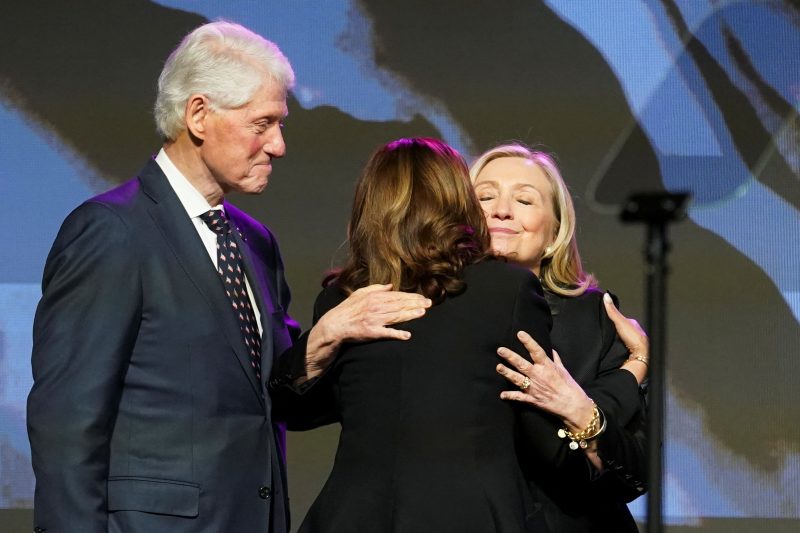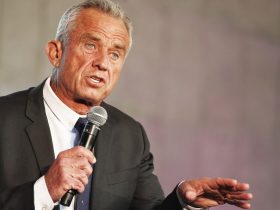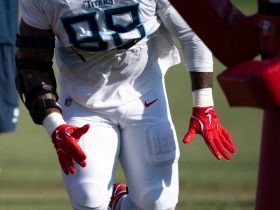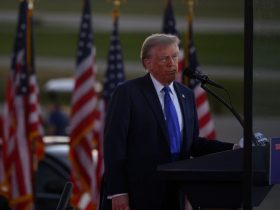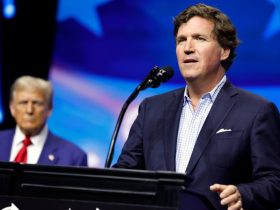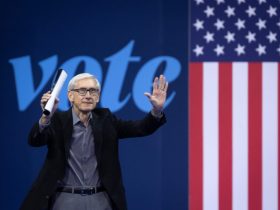CHICAGO — In 2016 Hillary Clinton addressed the Democratic National Convention as the barrier-busting standard-bearer — the presidential nominee who many supporters felt was on track to shatter what she has called “that highest, hardest glass ceiling.”
On Monday night, Clinton will return to the convention stage in a different role — the candidate who lost to Donald Trump eight years ago and is now emblematic of a unrealized goal suddenly resurrected with the nomination of Vice President Kamala Harris. It’s a bittersweet moment for many Democrats, who are eager to “finish the job,” as some of them put it this week.
“It’s about the unfinished business of electing a woman president,” said former Clinton adviser Mini Timmaraju, who leads a national abortion rights group. She said Clinton alums grew emotional at a reception the other night in Chicago and noted that some are playing leading roles in the effort to get Harris elected president.
Along with Clinton, the first night of the convention will feature President Joe Biden and first lady Jill Biden in the spotlight. Clinton’s speech will cap decades of appearances at Democratic conventions, where she has worn many hats — speaking as first lady when Bill Clinton was president in 1996, as a rising candidate herself in 2000, as a vanquished presidential contender in 2008, as the nominee in 2016 and as a party elder in 2020.
Now she is playing a supporting role for another woman going up against Trump. She and her husband endorsed Harris almost immediately after Biden dropped out of the 2024 race. Harris’s sudden ascent to the top of the Democratic ticket has intensified some parallels to 2016, even as Harris puts less emphasis on her gender than Clinton did.
“She’s got a lot of wisdom that can be imparted,” Rep. Debbie Dingell (D-Mich.) said of Clinton, “and I’m sure she’s excited to see another woman nominated.” Dingell said she is also happy to see a woman become the presidential nominee but added: “I’m looking forward to the day that we stop looking at someone’s gender.”
Clinton’s 2016 loss to Trump was a stinging blow for many Democrats, who looked at some pre-election polls with confidence and felt she was poised for victory. Since then, she has occupied a complicated place in the party — a respected figure but one associated with a painful moment that set off plenty of debate about Democrats’ strategy and direction, as well as the influence of sexism in politics. Some Democrats viewed Clinton as a political albatross and worked to distance themselves from her in subsequent elections.
She remains a polarizing figure and a villain for Republicans. As doubts mounted this summer about Biden’s ability to lead the ticket, Trump advisers gleefully promoted the long-shot idea that Clinton could take his place.
Clinton has been a fixture of Democratic conventions since the 1990s. A video clip of her clapping along enthusiastically to the “Macarena” at the 1996 convention — when she was first lady — continues to amuse the internet and resurfaced on social media ahead of her latest convention appearance.
In multiple speeches, she has nodded to the trailblazing nature of her political career. In 2008 — as the vanquished primary rival unifying behind Barack Obama — she noted, “My mother was born before women could vote,” and said, “My daughter got to vote for her mother for president.” In 2016, she declared, “We just put the biggest crack in that glass ceiling yet.”
In a memoir after Trump’s victory in 2016, Clinton acknowledged making mistakes but also blamed factors beyond her control, said she felt she was “shivved” and suggested she could not explain many voters’ distaste for her.
“Why am I seen as such a divisive figure and, say, Joe Biden and John Kerry aren’t?” she wrote. “They’ve cast votes of all kinds, including some they regret, just like me? What makes me such a lightning rod for fury? I’m really asking. I’m at a loss.”
Trump launched deeply personal attacks against Clinton, at times zeroing in on her gender and accusing her of playing the “woman’s card” in her career; the GOP nominee has taken a similar tone with Harris, mocking her name, laugh and intelligence and calling her weak.
In 2020, Clinton reemerged to speak at the Democratic convention as Biden challenged Trump. She focused on promoting Biden’s and then-vice-presidential pick Harris’s records over Trump’s and said little about her gutting loss four years earlier.
She briefly flicked at Harris’s historic role as the first Black and Indian American woman on a major-party presidential ticket.
“Tonight I am thinking of the girls and boys who see themselves in America’s future because of Kamala Harris — a Black woman, the daughter of Jamaican and Indian immigrants, and our nominee for vice president,” Clinton said. “This is our country’s story: breaking down barriers and expanding the circle of possibility.”
Timmaraju, president of Reproductive Freedom for All and former national women’s vote director for Clinton’s campaign, argued that Clinton helped awaken a “sleeping giant of American women’s political power” that has been on stark display since the Supreme Court overturned Roe v. Wade in 2022.
She said her 79-year-old mother was so enthusiastic about Clinton that she cast a write-in vote for her in the 2008 general election. Now she is eager to hear from Clinton. For some women in her mother’s generation who weren’t sure they would ever see a woman president, Timmaraju said, Clinton is a reminder of “the unfinished business of their life.”

